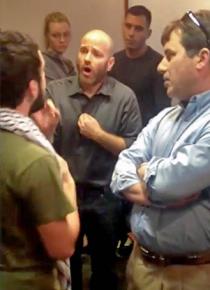You can’t erase the IDF’s crimes
Activists seeking to make a statement prior to a lecture celebrating the Israeli military were assaulted by a professor and an audience member, reports .
TWELVE MEMBERS of the Palestine Solidarity Committee (PSC) at the University of Texas at Austin (UT) disrupted a November 12 public lecture given by military historian Gil-li Vardi on "The Origin of Species: The Birth of the Israeli Defense Forces' Military Culture," hosted by UT's Institute of Israeli Studies (IIS).
Immediately following Vardi's introduction by Professor Ami Pedahzur, who is chair of the IIS, PSC member Mohammed Nabulsi stood up and stated, "Excuse me, we also have an introduction to make." Nabulsi began to read a prepared, two-minute statement, condemning the presence of former IDF soldiers on his college campus and the role of Israeli militias in facilitating the ethnic cleansing of Palestine.
But Nabulsi wasn't able to complete one sentence of his prepared statement before an unidentified audience member, claiming to be a "scholar," approached Nabulsi and shoved him, while shouting into Nabulsi's face. As the video footage shows, he pressed his body against Nabulsi as Nabulsi continued with his statement.

As Nabulsi reassured the audience that "your presenter will have every opportunity to speak," his assaulter then approached several other PSC members displaying the Palestinian flag and attempted to rip it from their hands. As Nabulsi continued, the "scholar" again approached Nabulsi, shouting, "I don't care about your problem!"
While the "scholar" reduced the ethnic cleansing of Palestinians to a personal "problem" of Nabulsi's, Pedahzur, the event's organizer, could be heard claiming his event was a "class" and yelling, "You are students, you know nothing!"
Both of these statements were, of course, false. First, Vardi's talk was not a lecture given for a scheduled course offered by the university, the disruption of which is prohibited. Rather, PSC members disrupted a public event, an action well within their rights under UT's Student Code of Conduct. Second, Nabulsi was not a student who knew "nothing," but rather a well-read Palestinian addressing the hidden history of Zionism that Zionist scholars have struggled to repress.
This might have been why Nabulsi's preface--that if he were able to complete his statement, PSC members would leave--was ignored, and why Pedahzur, forgetting the demeanor expected of a tenured and full professor, advanced against Nabulsi, torso-to-torso and nose-to-nose. Pedahzur had earlier questioned Nabulsi's heritage, asking incredulously, "How many years have you lived in Palestine?"
AS IT became clear that the defenders of Zionism would never let Nabulsi complete his prepared statement, PSC members began chanting, "Free, free Palestine!" "Long live the Intifada!" and "We want '48! We don't want two states!" and marched out.
As PSC members left Belmont Hall, they were accosted by police responding to calls from the lecture organizers describing "heated" exchanges in a public lecture they deliberately misrepresented as a "classroom." PSC members were then detained for 40 minutes, forced to sit on the building's steps as the cops checked their identification. Meanwhile, the incident's only assaulters, the unidentified "scholar" and Pedahzur, remained inside the building and were ignored by police when they departed the event.
Pedahzur's behavior during PSC's disruption came on the heels of the settlement of the case of Professor Steven Salaita at the University of Illinois at Urbana-Champaign, granting Salaita $875,000 after his wrongful firing for tweeting comments condemning Israel's ethnic cleansing of Gaza during Operation Protective Edge. Salaita never aggressively touched, pushed his body nor pressed his face nose-to-nose against one of his students. He was fired for touching a keyboard.
Neither his tenure nor his Zionist scholarship should protect Pedahzur from facing the full consequences of assaults and physical intimidation of students. The same goes for the self-identified "scholar" who, instead of respecting the rights of students to exercise free speech, chose to play tug-of-war with their possessions.
Pedahzur and Vardi are typical representatives of liberal Zionism, criticizing the features of Zionist settler-colonialism that undermine their liberal ideals while implicitly relying on and endorsing Zionism's racist fantasy.
Last month, for example, Vardi described the "birth" of the Israel Defense Forces (IDF), in which Vardi served as a lieutenant for two years, as a "big-bang moment." In her words: "If you think of any other modern army--say, the Indian Army, or the Jordanian Army--they're all based on colonial forces that were trained and educated in colonial traditions. The IDF had no history."
The ideology of the ruling class always that seeks the erasure of its crimes from history, which is an especially pressing task given the ethnic cleansing of nearly 1 million Palestinians during the 1948 war for Palestine through the work of paramilitary Zionist militias such as the Stern Gang, the Irgun and the Haganah, which maintained ties with the Nazis and in some cases carried out operations on their behalf during the Second World War.
In the ethnic cleansing of Palestine's indigenous population, the history of the IDF drew on histories of settler colonialism as well as on European fascism--for example, in the dark brown uniforms and leather bandoliers of Vladimir Jabotinsky's revisionist Zionist militias, resembling the fascistic militarism of the leader from whom he took inspiration, Benito Mussolini.
If Vardi sought to convey a more nuanced claim, her imprecise language celebrated a military organization following a month of bloody violence against Palestinians. No matter how loudly or aggressively liberal Zionist intellectuals claim they are "pro-Palestinian," their physical and verbal silencing of 12 Palestine solidarity activists wishing to speak a repressed history revealed their true intentions.
Palestine solidarity activists should stand with and take inspiration from the heroic demonstrations taking place against systemic anti-Black racism on college campuses, and challenge Zionist racism as practiced through scholarship when it seeks history's erasure. University professors who meet such challenges with assault and physical intimidation should not be immune from the consequences of their actions.


